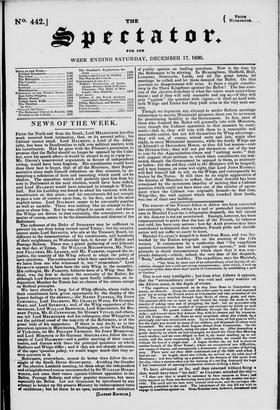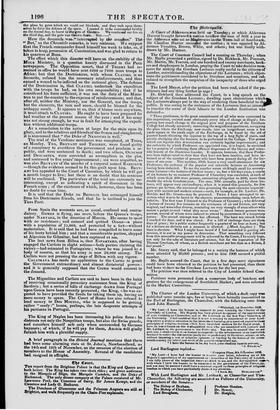The rumour of the French defeat in Africa has been
converted into certainty ; though, owing to a real or pretended incomplete- ness in Marshal CLAUSEL'S telegraphic despatch, the full extent
of the disaster is not yet ascertained. Enough, however, has been communicated to prove that the loss of the French, by sickness
and cold, has been very serious : how far Arab prowess may have contributed to diminish their numbers, French pride and mortifi- cation will not suffer us easily to learn.
Marshal CLAUSE L'S despatch is dated from Bona, and was 'for- warded by the Toulon telegraph on the evening of the 11th instant. It commences by a confession that "the expedition against Constantine has not had complete success;" and then proceeds to detail circumstances which show that it was com- pletely defeated,—which, indeed, the very date of the despatch, "Bona," sufficiently testifies. The expedition, says the Marshal, . . . . "has been, by some sort of an extraordinary event beyond all cal- culation, changed into a real and strong reconnoissance; after which, [took up a position within three short days' march of Constantine, by establishing a port at Gueltna."
This is not very intelligible ; but from what follows it appears, that the "extraordinary event" was cold and rainy weather on the African coast, in the depth of winter. "The expedition encountered on its way from Bona to Constantine no enemy, no obstacle. Along the road, the tribes came to meet it, and expressed peat joy at seeing the French arrive at Constantine and take possession of the city. The army marched through large flocks of sheep, goats, and oxen. The peasants often ran to meet us, and showed the troops the mode in that country of yoking oxen and of ploughing the land : but we proceeded only slowly, on account of the number of waggons and carriages by which we were encumbered. We passed without difficulty through the defile of Rachel- Aylat ; and learned there that Achtnet Bey, with his women and his treasures, had left Constat,tine. At Soma we were surprised, about five o'clock, by a piercingly cold rain mixed with snow. Up to that time, all had gone on well; but the night was mortal to many of our soldiers, and thousands of others were benumbed. We were only three leagues distant from Constantine. On the 21st, we re..umed our march, seeing the place before us. After descending a gentle declivity on which we had encamped, we found the Oued-Ben-Mezioug much swollen ; and we were obliged to ford it, the water reaching up to our waists, and the snow continuing to fall : nevertheless, we crossed the river without the lo.s of a single man. A league further on, we had to traverse another branch of the River Tumel ; where we encountered new difficulties, new causes of disease, and consequently a diminution of our number of fighting men. There were not then 41.100 combatants out of the 7000 with whom I had set out. At length, about two o'nlock, we arrived on the table-land of Mantsoure ; and were taking up a position at the distance of 240 yards from the city, when a cannon-shut and the hoisting of a red flag destroyed the hupe I had entertained of entering Constantine without striking a blow."
To have advanced so far, and then returned without firing a shot, would have been "too bade' so CLAUSEL attacked the city- " I then saw that it would be necessary to have recourse to force; and every moment iny force was decreasing more and more, for the weather was hor- rible. The earth and the men were covered with snow, aud the carriages dis- appeared, embedded in the mud. The inhabitants of the city did not wish to engage in hostilities against us. Some 'Cabello were, however, introduced uito the place by gates which we could not blockade, and they took upon them- selves by force the defence of the town. I caused it to be cannonaded briskly on the second day, to burst in she gate of Cantara. We continued our fire on She third day, and the gate was thrown dome But—" Here the despatch watts" interrapted by the weather." The "But," as the Chronicle remarks, is very ominous. We suppose that the French commander found himself too weak to take, or, if taken to keep, possession of, Constantine, and was glad to return to his quarters at Bona.
The effect which this disaster will have on the stability of the MoLE Ministry, is a question keenly discussed in the Paris meWspa pers. The Opposition assert, that if TRIERS had re- mained in office he would have sent 6000 or 7000 more troops to Africa; but that the Doctrinaires, with whom CLAUSEL is no favourite, refused him the necessary reinforcements, and thus caused a wound to be inflicted on the national glory. The defence of the Doctrinaires is, that CLAUSEL undertook the expedition with the troops he had, on his own responsibility; that if he considered his force sufficient, it was not the duty of the Minis- ters to put the country to the expense of reinforcements; and that, after all, neither the Ministry, nor the General, nor the troops, but the elements, the rain and snow, should be blamed for the unhappy result. It appears to us, that if blame rests anywhere, it Must attach to CLAUSEL. He ought to have been prepared for bad weather at the present season of the year ; and if his army was not strong enough, he was in fault for attempting the expedi- tion without additional troops. As a consolation to the nation at large for the stain upon its glory, and to the relatives and friends of the frozen and slaughtered, it is announced that " the Duke of NEMOURS is well."
The trial of the Vendome mutineers was completed, at Tours, on Monday. Two, BRUYANT and THIERRY, were found guilty of a conspiracy to overthrow the government and proclaim a re- public, and were sentenced to death; and two others, OUDINOT and DESCARTES, were convicted as accomplices in the plot, and sentenced to five years' imprisonment ; six were acquitted, as was also BRUYANT of the murder of a corporal named BARRIEUX —though the evidence seemed to fix this guilt upon him. BUY- ANT has appealed to the Court of Cassation, by which he will get a month longer to live; but there is no doubt that his sentence will be confirmed. The particulars of the trial are extremely un- interesting, except as indicating a spirit of discontent in the French army ; of the existence of which, however, there has been no doubt for some time.
It is said that the Duke DE BROGUE has estranged himself from his Doctrinaire friends, and that he is inclined to join the Tiers Pa rti.



























